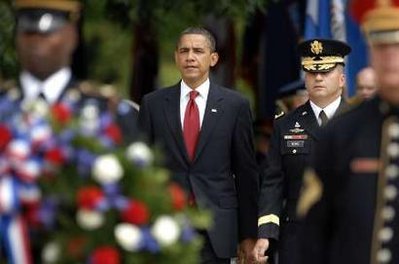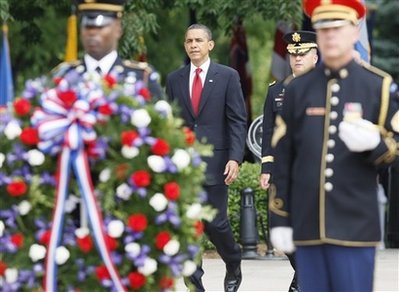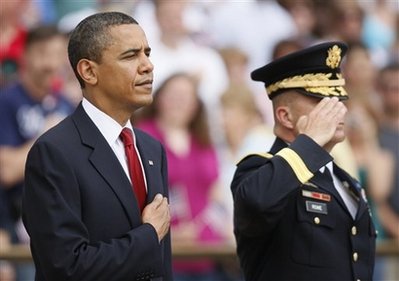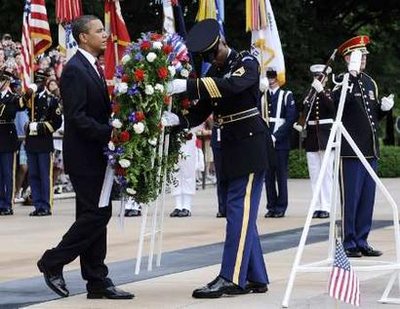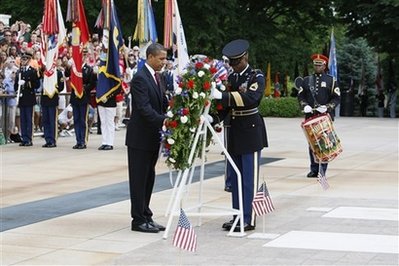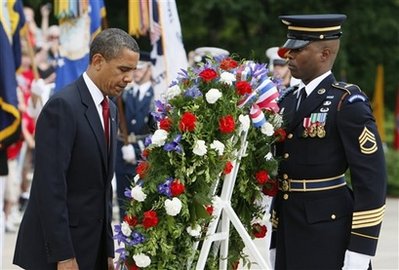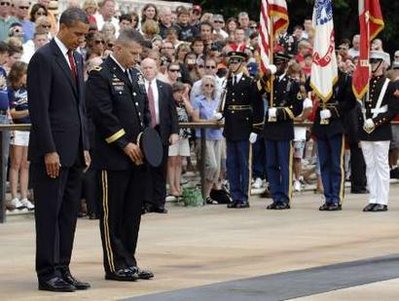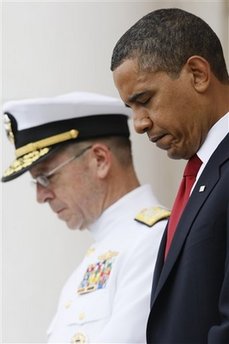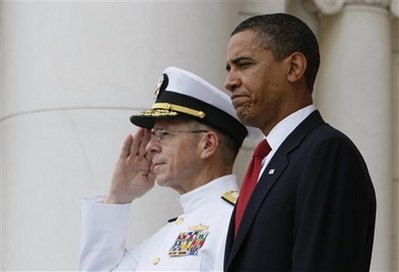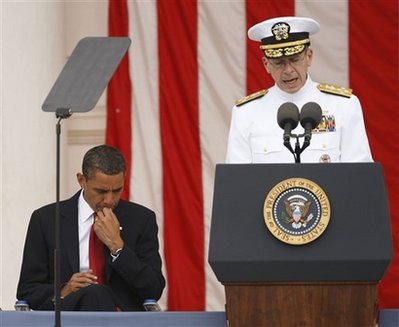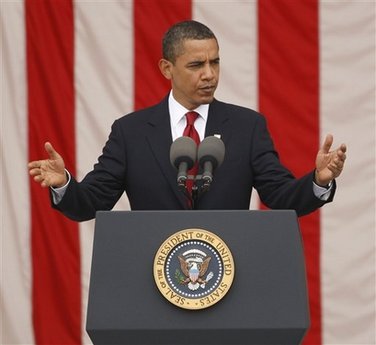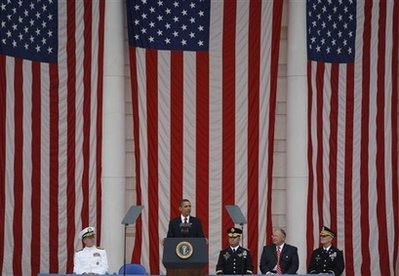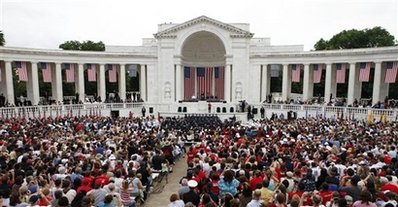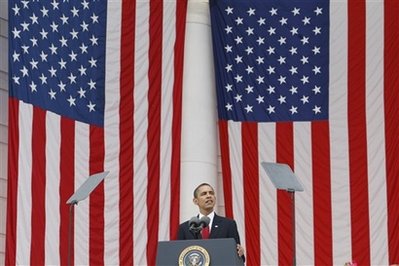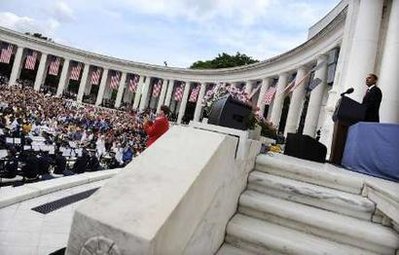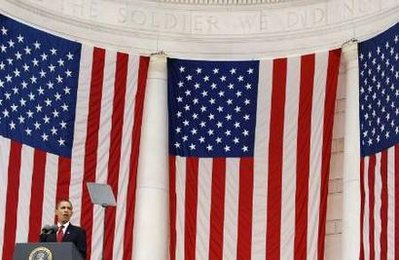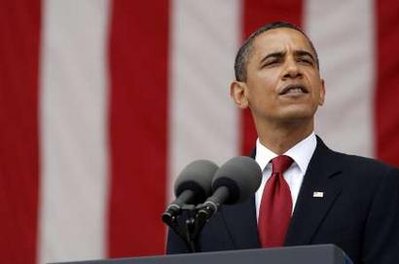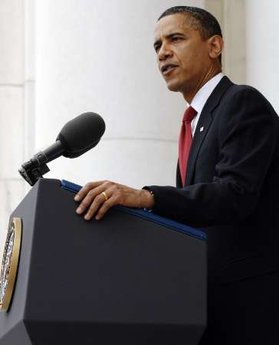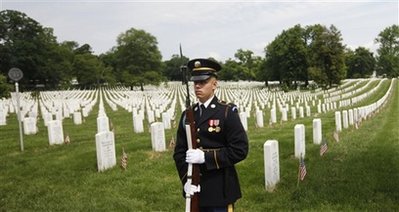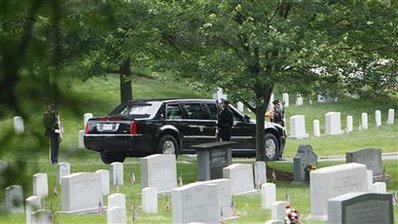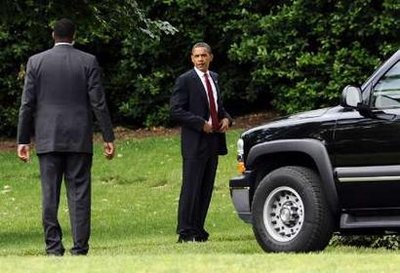Remarks as Delivered by Adm. Mike Mullen, chairman of the Joint Chiefs of Staff , Memorial Amphitheatre, Arlington National Cemetery, Arlington, Va. Monday, May 25, 2009
Mr. President and Madame First Lady, members of the Cabinet and Congress. Distinguished guests, ladies and gentlemen.
Our first celebrations of Memorial Day emerged during the reconstruction years of this Union.
Some then called it Decoration Day. When fresh flowers of the month adorned hallowed ground beneath wooden markers and weathered sculpture, all across this land. They still do, and we still do.
A poet of the era, who volunteered as a nurse in the bloodstained hospitals, not far from these grounds. Made lilacs bloom for a president who not only “endured that hour, but unflinchingly stemmed it and resolved to life himself and the Union out of it.” They have bloomed every spring hence.
For him, and for fellow and future generations, who marched and died to advance an idea, and a promise, of a more perfect union to ensure the full and fair experiment would continue to live and prosper, for all.
“Where is the eloquence, as time goes on, to tally these green mounds?”
Walt Whitman then asked of the unspeakable numbers around him, who shed their lives for that same promise. “Let them be our fame,” he said, “Our monument.”
Today, we too search for eloquence to paint the glory of their fame.
Tongues struggle with the sacrifice of fallen heroes like Technical Sergeant Phillip Myers, and that of his surviving bride, young daughter and small son.
To honor Americans who everyday perform the extraordinary, just as Philip did.
As he defused bombs on highways and in neighborhoods, first in Iraq and then in Afghanistan.
His father would later remark that Philip always looked out for those on his team and if he thought a job was too dangerous, he’d check it out himself.
And as he disabled another device this past April, in Helmand Province, Philip was killed.
His body was laid to rest here, in Section 60. His spirit joins a host of Americans, who have fought and died for each other and continue to sacrifice for each other. Whose ideas and talents were, and still are, revealed by opportunity and inspired by the promise of a better life. For themselves and for their children.
Yes, today marks a great sacrifice. But every year we honor more than that. We celebrate renewal.
Though each birth of freedom has come to us in struggle, we have no reason to believe any should be less so for us or for others who would strive for the highest ideals of mankind.
Each birth has always united anew, propelled anew and inspired anew.
None of us can fully know the limits of the sacrifice, or the gifts of millions we honor today.
What we do know are the great stakes of that struggle as bravely passed on to us. What we do comprehend is the honor, and the dignity, and the urgency of our task. What we do understand, as is revealed to us more fully with each passing spring is how precious and very rare these gifts truly are, in and among this world.
Those who rest here, and in every sacred plot across the nation and abroad, in battlefields and oceans, both unmarked and adorned have given unto our hands and those of future generations the fullest reach of humanity. That reach is our highest mountain.
Their lifting spirit carries that most revolutionary idea that men and women would rise to serve a cause greater than themselves in order to make themselves truly equal and truly free.
Their gifts and lives lived fullest and visions of endless possibilities to fulfill. And thanks to them. Our inheritance is the promise of springtime ever rising upon this land.
No one values that inheritance or the sacrifice of our men and women in harms way more than our Commander-in-Chief. And in every way possible, he and our First Lady place our troops and their families first. First in their daily lives. First in their thoughts and first in their hearts. They have embraced our military families, and they have made their dreams of each their very own. And for the wounded, their families, and the families of the fallen, they understand what eternal debts we truly owe.
Mr. President, we are grateful for your inspiration, for your support, and for most of all, your leadership in this time of war.
Ladies and Gentleman, it is my distinct honor to introduce to you, our Commander-in-Chief, the President of the United States.
REMARKS BY THE PRESIDENT
ON MEMORIAL DAY
Memorial Amphitheater
Arlington National Cemetery
THE PRESIDENT: Thank you, Admiral Mullen, for that generous introduction and for your sterling service to our country. To members of our armed forces, to our veterans, to honored guests, and families of the fallen — I am deeply honored to be with you on Memorial Day.
Thank you to the superintendent, John Metzler, Jr., who cares for these grounds just as his father did before him; to the Third Infantry Regiment who, regardless of weather or hour, guard the sanctity of this hallowed ground with the reverence it deserves — we are grateful to you; to service members from every branch of the military who, each Memorial Day, place an American flag before every single stone in this cemetery — we thank you as well. We are indebted — we are indebted to all who tend to this sacred place.
Here lie Presidents and privates; Supreme Court justices and slaves; generals familiar to history, and unknown soldiers known only to God.
A few moments ago, I laid a wreath at their tomb to pay tribute to all who have given their lives for this country. As a nation, we have gathered here to repeat this ritual in moments of peace, when we pay our respects to the fallen and give thanks for their sacrifice. And we’ve gathered here in moments of war, when the somber notes of Taps echo through the trees, and fresh grief lingers in the air.
Today is one of those moments, where we pay tribute to those who forged our history, but hold closely the memory of those so recently lost. And even as we gather here this morning, all across America, people are pausing to remember, to mourn, and to pray.
Old soldiers are pulling themselves a little straighter to salute brothers lost a long time ago. Children are running their fingers over colorful ribbons that they know signify something of great consequence, even if they don’t know exactly why. Mothers are re-reading final letters home and clutching photos of smiling sons or daughters, as youthful and vibrant as they always will be.
They, and we, are the legacies of an unbroken chain of proud men and women who served their country with honor; who waged war so that we might know peace; who braved hardship so that we might know opportunity; who paid the ultimate price so we might know freedom.
Those who rest in these fields fought in every American war. They overthrew an empire and gave birth to revolution. They strained to hold a young union together. They rolled back the creeping tide of tyranny, and stood post through a long twilight struggle. And they took on the terror and extremism that threatens our world’s stability.
Their stories are the American story. More than seven generations of them are chronicled here at Arlington. They’re etched into stone, recounted by family and friends, and silently observed by the mighty oaks that have stood over burial after burial.
To walk these grounds then is to walk through that history. Not far from here, appropriately just across a bridge connecting Lincoln to Lee, Union and Confederate soldiers share the same land in perpetuity.
Just down the sweeping hill behind me rest those we lost in World War II, fresh-faced GIs who rose to the moment by unleashing a fury that saved the world. Next week, I’ll visit Normandy, the place where our fate hung on an operation unlike any ever attempted, where it will be my tremendous honor to address some of the brave men who stormed those beaches 65 years ago.
And tucked in a quiet corner to our north are thousands of those we lost in Vietnam. We know for many the casualties of that war endure — right now, there are veterans suffering and families tracing their fingers over black granite not two miles from here. They are why we pledge anew to remember their service and revere their sacrifice, and honor them as they deserve.
This cemetery is in and of itself a testament to the price our nation has paid for freedom. A quarter of a million marble headstones dot these rolling hills in perfect military order, worthy of the dignity of those who rest here. It can seem overwhelming. But for the families of the fallen, just one stone stands out — one stone that requires no map to find.
Today, some of those stones are found at the bottom of this hill in Section 60, where the fallen from Iraq and Afghanistan rest. The wounds of war are fresh in Section 60. A steady stream of visitors leaves reminders of life: photos, teddy bears, favorite magazines. Friends place small stones as a sign they stopped by. Combat units leave bottles of beer or stamp cigarettes into the ground as a salute to those they rode in battle with. Perfect strangers visit in their free time, compelled to tend to these heroes, to leave flowers, to read poetry — to make sure they don’t get lonely.
If the fallen could speak to us, what would they say? Would they console us? Perhaps they might say that while they could not know they’d be called upon to storm a beach through a hail of gunfire, they were willing to give up everything for the defense of our freedom; that while they could not know they’d be called upon to jump into the mountains of Afghanistan and seek an elusive enemy, they were willing to sacrifice all for their country; that while they couldn’t possibly know they would be called to leave this world for another, they were willing to take that chance to save the lives of their brothers and sisters in arms.
What is thing, this sense of duty? What tugs at a person until he or she says “Send me”? Why, in an age when so many have acted only in pursuit of the narrowest self-interest, have the soldiers, sailors, airmen and Marines of this generation volunteered all that they have on behalf of others? Why have they been willing to bear the heaviest burden?
Whatever it is, they felt some tug; they answered a call; they said “I’ll go.” That is why they are the best of America, and that is what separates them from those of us who have not served in uniform — their extraordinary willingness to risk their lives for people they never met.
My grandfather served in Patton’s Army in World War II. But I cannot know what it is like to walk into battle. I’m the father of two young girls — but I can’t imagine what it’s like to lose a child. These are things I cannot know. But I do know this: I am humbled to be the Commander-in-Chief of the finest fighting force in the history of the world.
I know that there is nothing I will not do to keep our country safe, even as I face no harder decision than sending our men and women to war — and no moment more difficult than writing a letter to the families of the fallen. And that’s why as long as I am President, I will only send our troops into harm’s way when it is absolutely necessary, and I will always provide them with the equipment and support they need to get the job done.
I know that military families sacrifice more than we can understand, and feel an absence greater than we can comprehend. And that’s why Michelle and I are committed to easing their burden.
And I know what a grateful nation owes to those who serve under its proud flag. And that’s why I promise all our servicemen and women that when the guns fall silent, and you do return home, it will be to an America that is forever here for you, just as you’ve been there for us.
With each death, we are heartbroken. With each death, we grow more determined. This bustling graveyard can be a restless place for the living, where solace sometimes comes only from meeting others who know similar grief. But it reminds us all the meaning of valor; it reminds us all of our own obligations to one another; it recounts that most precious aspect of our history, and tells us that we will only rise or fall together.
So on this day of silent remembrance and solemn prayer I ask all Americans, wherever you are, whoever you’re with, whatever you’re doing, to pause in national unity at 3:00 this afternoon. I ask you to ring a bell, or offer a prayer, say a silent “thank you.” And commit to give something back to this nation — something lasting — in their memory; to affirm in our own lives and advance around the world those enduring ideals of justice, equality, and opportunity for which they and so many generations of Americans have given that last full measure of devotion.
God bless you, God bless the fallen, and God bless the United States of America.
President Obama arrives with Army Major General Richard Rowe, Commander of the Military District of Washington, to lay a wreath at the Tomb of the Unknowns during the Memorial Day observance at Arlington National Cemetery
President Barack Obama, accompanied by Major General Richard J. Rowe, pause prior to the president laying a wreath at the Tomb of the
Unknowns, Monday, May 25, 2009
President Obama and Army Major General Richard Rowe Commander of the Military District of Washington, bow their heads after placing a wreath at the Tomb of the Unknowns
President Obama and Joint Chiefs Chairman Adm. Michael Mullens, bow their heads during the invocation of a Memorial Day ceremony
President Barack Obama stands with Joint Chiefs Chairman
Admiral Mike Mullen at Arlington National Cemetery
President Obama listens to Joint Chiefs Chairman Admiral Mike Mullen during
the Arlington National Cemetery Memorial Day Commemoration
President Obama gestures prior to delivering his remarks at the
Arlington National Cemetery Memorial Day Commemoration
President Barack Obama delivers his remarks at the Arlington
National Cemetery Memorial Day Commemoration
An honor guard stands at attention at Arlington National Cemetery as the motorcade of President Barack Obama drives past on Memorial Day
President Barack Obama returns to the Oval Office in Washington after
a Memorial Day observance at Arlington National Cemetery
Michael Robert Patterson was born in Arlington and is the son of a former officer of the US Army. So it was no wonder that sooner or later his interests drew him to American history and especially to American military history. Many of his articles can be found on renowned portals like the New York Times, Washingtonpost or Wikipedia.
Reviewed by: Michael Howard

